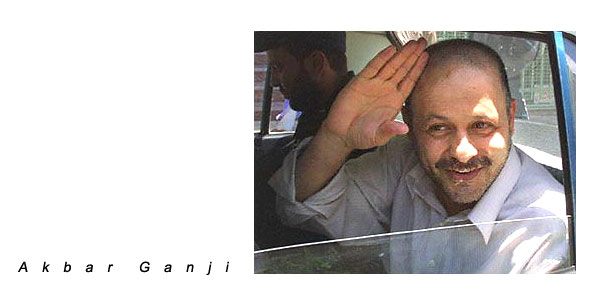Warum hat die Islamische Republik den Frauen den Krieg erklärt, die für ihre Rechte eintreten? Akbar Gandschi, der bekannteste iranische Dissident, hat eine brillante Erklärung (sein Essay hier): Die Geschlechtersegregation ist wichtig, um zu simulieren, dass der Iran eine Gesellschaft sei, in der die Scharia gelte.

Zu simulieren! Denn wie Gandschi schreibt, die wesentlichen Bestimmungen der Scharia werden im Iran de facto gar nicht angewendet:
1 Dieben werden die Hände nicht abgeschnitten.
2 „Gegnern Gottes“ werden nich je ein gegenüberliegendes Bein und ein Arm amputiert.
3 Das Talionsgesetz – Auge um Auge, Zahn um Zahn – wird nicht angewendet.
4 Die Steinigung wird nicht angewendet.
5 Die Gesetze gegen Apostasie werden nicht angewendet.
6 Die Vorschrift über den Dschihad werden nicht angewandt.
7 Die Besteuerung von Nichtmuslimen wird nicht praktiziert.
8 Die Auspeitschung bei islamisch unkorrektem Verhalten wir nicht angewandt.
9 Das Zinsverbot wird nicht beachtet, sondern durch findige Weisen, Zinsen zu „Porfit“ zu erklären, umgangen.
10 Die Zahlung des Zehnten wird vernachlässigt.
Gandschis sarkastische Folgerung:
Only one thing remains that suggests that the system is Islamic: women’s hijab. The Islamic Republic’s regime makes women wear the hijab by force so that, one, the country is considered Islamic and, two, there can be a justification for continued rule by the vali-ye faqih [supreme Islamic jurist/cleric].
Die Unterdrückung der Frauen mit allerlei Vorschriften über islamische Kleidung, vor kurzem abermals heftig in Szene gesetzt, hätte also nicht die Funktion, die Scharia durchzusetzen, sondern sie wäre ein Versuch, die Nichtbeachtung der Scharia zu bemänteln und damit eine Schein-Legitimation der Theokratie zu liefern:
Today, the Islamic Republic stands naked and without a cover, because, based on to the criteria of the fuqaha (Rechtsgelehrte, J.L.), the country is not Islamic; because there is no justification for the continuation of the fiqh-based State; because it is brute force that has made the survival of rule by the fuqaha possible. There is no reason or logic for covering up the naked oppression and intimidation. So, they cover up women in order to put their Islamism on display. It is that simple.
Gandschi geht noch weiter: Er fragt, warum die Frauenfrage für das Regime eine so existentielle Frage geworden ist, dass es zu immer brutalerer Unterdrückung greift:
The State is opposing women’s demands because the only thing that justifies the authority and guardianship of the fuqaha is the implementation of the precepts of fiqh and the only precepts that remain are the precepts that rule out freedom and equality for women. So, the quarrel is essentially not over religiosity or irreligiosity. The quarrel is over democracy or dictatorship, since equality is the shared foundation of democracy and human rights. Anyone who is opposed to the equality of women and men, believers and unbelievers, clerics and non-clerics, etc. is opposed to democracy and human rights. And anyone who fights for equality in any arena is, knowingly or unknowingly, fighting for democracy and human rights.
Die Frauenfrage ist im Grunde die demokratische Frage. Am Ende zieht Gandschi eine interessante Parallele. Die Kemalisten mit ihrem Kopftuchbann und dien Mullahs mit ihrer Kopftuchvorschrifte werden von ihm als zwei verschiedene, beide zum Scheitern verurteilte, Wege des Umgangs mit der Frauenfrage bezeichnet:
Women’s liberation will be achieved when the plurality of women’s social identities is officially recognized and when the State – any State – stops imposing on women norms that suit the ruling elites and trying to create ‚a woman in line with the ideology‘. Turkey’s Kemalists see women who observe the hijab as barbarous and Iran’s fundamentalists consider women who do not observe the hijab or who do so improperly as barbarous. But is barbarity anything other than a State that drives its citizens in a direction that they do not want to go by brute force and makes them wear clothes that they do not want to wear? We must accept human beings‘ right to choose their own customs. Women must not be used as a means for achieving States and ideologies‘ ends. Freedom and equality have to be accepted so that everyone can live their lives on the basis of their own understanding of the good. The modern individual is someone who creates him/herself as a work of art. Every work of art is different from every other work of art. Democracy means recognizing differences and the right to be different and to think differently.
Ich würde dennoch einen Unterschied zwischen dem Kopftuchverbot der Kemalisten und dem Haarzeigeverbot der Mullahs sehen wollen: Denn das erste – wie auch immer autoritär – eröffnet den Frauen (jedenfalls der Tendenz nach) alle gesellschaftliche Möglichkeiten, das zweite verschließt ihnen ganze Welten. Das erste definiert die Frau als gleichrangig (jedenfalls ideell), das zweite definiert sie als das ganz andere, den Männern untergeordnete und zweitrangige Wesen.
Trotzdem: Gandschi hat wieder den Nerv getroffen.